UK Plastics Reports 2019-2022, A Digest

A sunset panorama of Mullion Cove in Cornwall
Alok Sharma, President of COP26 in Glasgow, said in March of 2021 that “demand is snowballing for commencing negotiations on a new global agreement to tackle marine plastic litter.” In the UK over the past year, this demand has manifested in several ways among different key stakeholder groups.
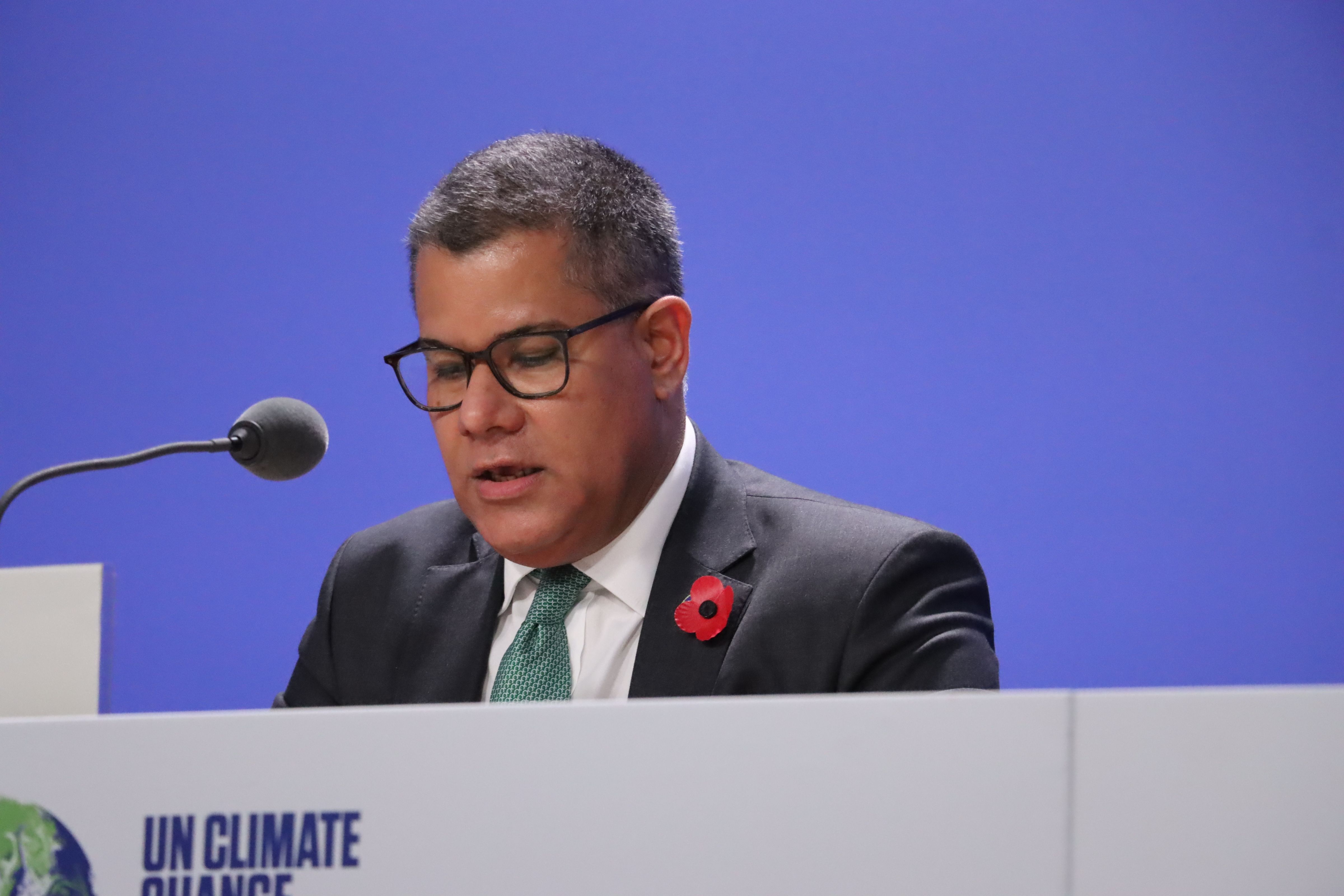
Alok Sharma speaks at COP26 in November 2021
Beyond the UK Government’s support for a new treaty to end plastic pollution at UNEA 5.2, there are a multitude of intersecting domestic efforts to curb plastic pollution. What follows is a summary of multiple reports on plastics over the past few years from four different stakeholder groups in the plastics crisis: government, academia, civil society, and large businesses. Taken together, this can be seen as a cross-section of domestic stakeholder views on plastic in the leadup to the UK Plastic Treaty Dialogues and INC-1 in November 2022.
OPLN is a neutral convener of stakeholders. The inclusion of reports here does not imply favor for any one viewpoint. Subsequent OPLN media installments will include reports from more stakeholders and stakeholder groups.
Government
The House of Commons Library’s briefing paper on plastic waste in the UK (published March 2022) offers a range of useful information of recent government positions on the plastics issue, including information on the UK Government’s and devolved Governments' plans and ambitions to reduce avoidable plastic waste.
Points of interest in this briefing:.
- The UK has various obligations under international and national law relating to the shipment of waste abroad, particularly under the UN Basel Convention on the Control of Transboundary Movements of Hazardous Waste and their Disposal (the Basel Convention). The Basel Convention has been recently amended to require that a Prior Informed Consent procedure is used for the shipment of certain types of plastic waste.
- The Scottish Government has consulted on proposals and made regulations to introduce a 20p deposit return scheme (DRS), expected to begin in August 2023. DRS infrastructure, such as reverse vending machines, will start rolling out from summer 2022. Work is planned to introduce schemes across the rest of the UK in due course.
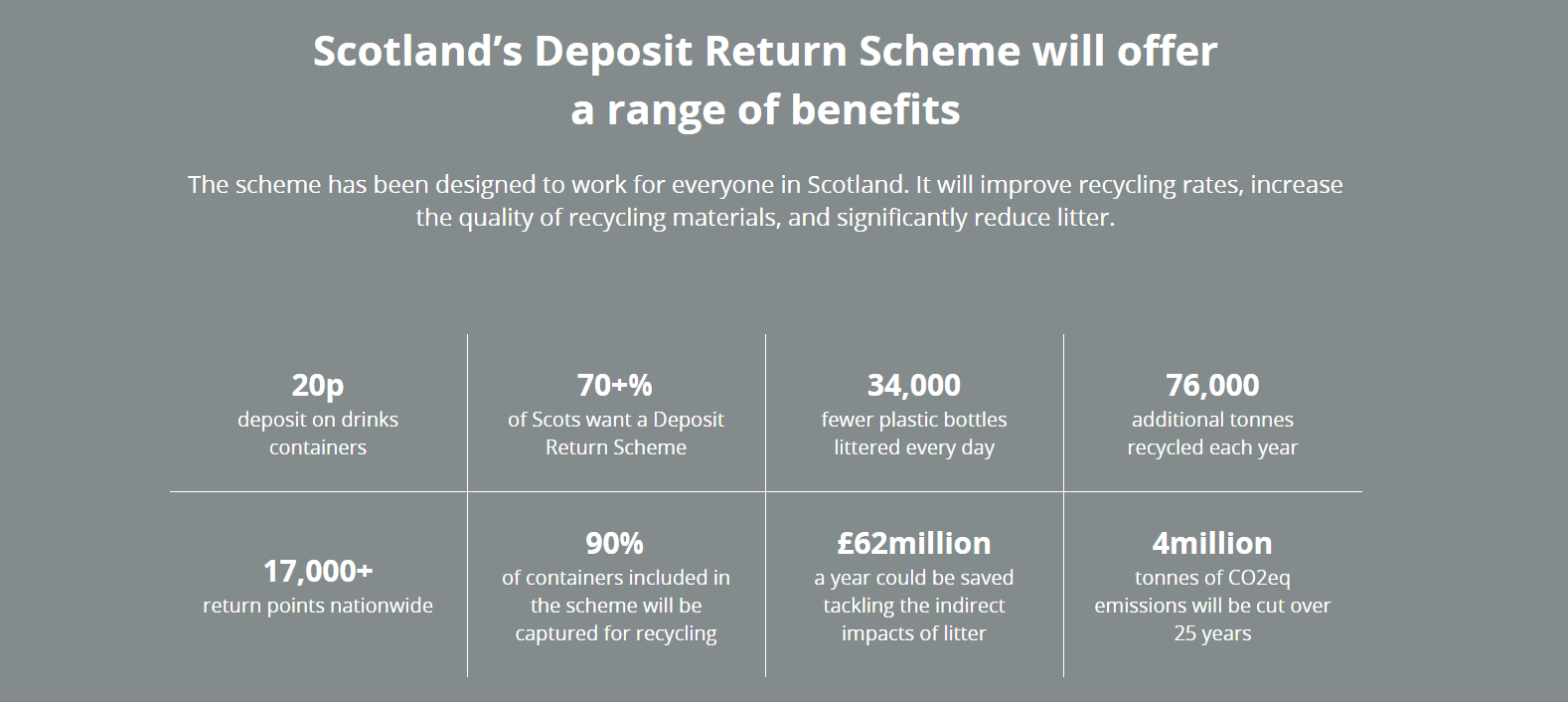
From Zero Waste Scotland
- The UK has supported the Global Plastic Action Partnership (GPAP) since its launch in 2018. GPAP brings together world leaders, decision-makers, and industry to take collaborative action on tackling plastic pollution in developing countries. GPAP has so far established partnerships in Indonesia, Ghana, Vietnam, Pakistan, Nigeria and the state of Maharashtra (India).
The UK’s contribution to GPAP supports the development of inclusive, multi-stakeholder platforms, with the aim of engaging 25 countries by the year 2025. The activities funded through this programme will help tackle the threat of plastic waste before it enters the ocean and support the transition to a circular economy.
The UK supports the collaborative efforts of GPAP and the Waste and Resources Action Programme (WRAP), a UK based NGO working globally to reduce the environmental costs of the food, clothing and plastic packaging we use. See the following press release for further information: WRAP and GPAP Partner to Tackle Global Plastic Pollution together.
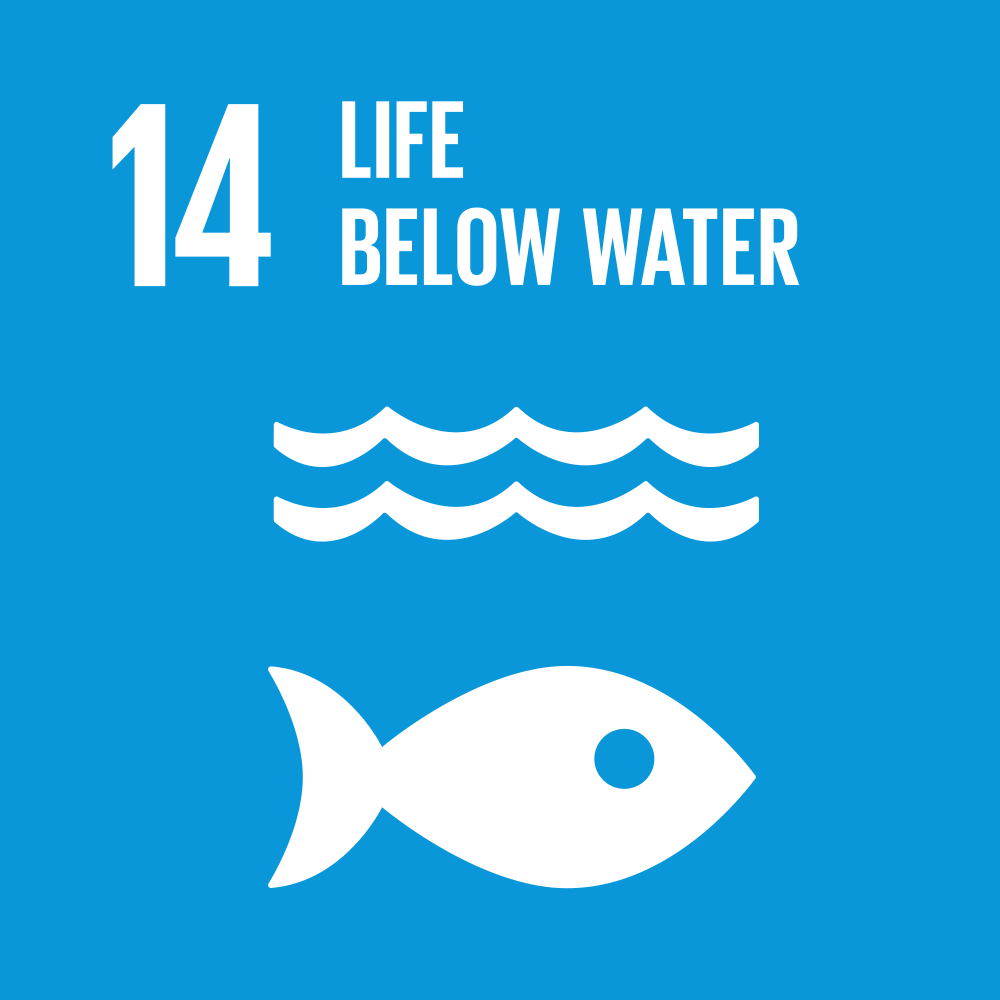
Academia - University of Plymouth
Research at the University of Plymouth was the first to demonstrate the widespread occurrence of microscopic particles in the environment. Work led by Professor Richard Thompson showed that particles which he described as ‘microplastic’ had accumulated in the oceans since the 1960s and were now widespread.
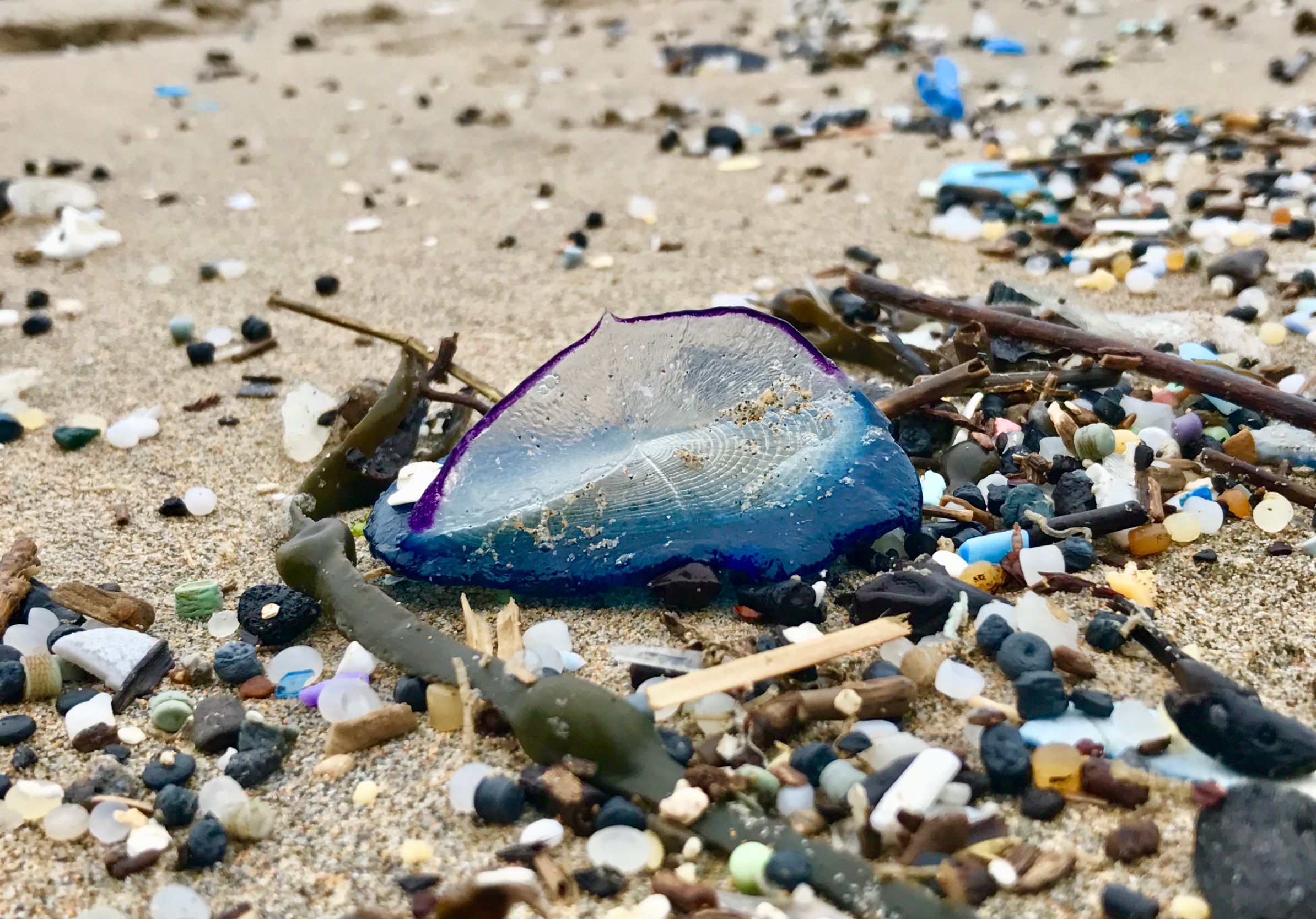
The work of tracking plastic pollution in the environment continues at Plymouth through various projects, among them BIO-PLASTIC-RISK. Started in 2020 and funded through 2024, the project brings together internationally recognised polymer scientists, marine and terrestrial biologists and ecotoxicologists to assess biodegradable plastics and their effect on the environment.
Richard Thompson: “For years, biodegradable materials – including plant-based bioplastics – have been highlighted for their potential to reduce the environmental impact of packaging waste. However, there hasn’t been the detailed research to identify precisely how that might be achieved. Through this project, we hope to establish, in the open environment as opposed to managed waste systems, what works and what doesn’t, in terms of the materials’ characteristics and effects.”
Recent updates from Plymouth show some new tech being implemented to track microplastics. Francesca De Falco, a research fellow on BIO-PLASTIC-RISK, posted pictures of new Py-GCxGC-TOFMS machines on location.
According to Chromatography Today, these machines use Pyrolysis (Py) in combination with Comprehensive Gas Chromatography (GCxGC) and Time-Of-Flight Mass Spectrometry (TOF-MS). While other analytic strategies are more commonly used, Py-GCxGC-TOFMS “requires minimal sample preparation and provides powerful chromatographic separation with high quality deconvoluted mass spectral data.
Richard Thompson tweeted: “Fantastic to have this working, well done for all the hard work. This will add a new dimension to our #microplastics analysis suite.”
Civil Society - EIA
The Environmental Investigation Agency, a UK-registered charity that works on a range of environmental campaigns, is one of the leading organizations in the global plastics treaty process and domestic efforts to end plastic pollution in the environment.
A series of recent reports and thought-starters from the EIA and its collaborators over the years have laid out major problems with plastic use in the UK, and have considered in detail what a successful global plastic treaty would look like.
Checking out on Plastics (2019)
For three years in a row, the Environmental Investigation Agency (EIA) and Greenpeace UK surveyed the major supermarkets and grocery retailers in the on their efforts to reduce plastic pollution. The full report of this effort, along with company scorecards, is available here.
Some of EIA’s recommendations to plastics stakeholders included:
- Addressing the drivers of single-use packaging. Promote shorter supply chains and seasonal produce; ban excessive packaging used for marketing objectives
- Scrutiny for non-conventional plastics. Avoid false solutions involving non-conventional plastics (bio-based, biodegradable, compostable). In cases where biodegradable packaging must be used, it should be certified to British Standard EN 13432 and only sold in municipalities which have the appropriate industrial composting/anaerobic digestion facilities.
- Reduce plastic pellet loss. Introduce requirements for suppliers to implement best practice measures to prevent plastic pellet loss, with third party auditing and reporting requirements. Ensure that certification to the Publicly Available Standard (PAS) on pellet loss, adopted in July 2021, is a universal obligation for all relevant actors in their supply chain.
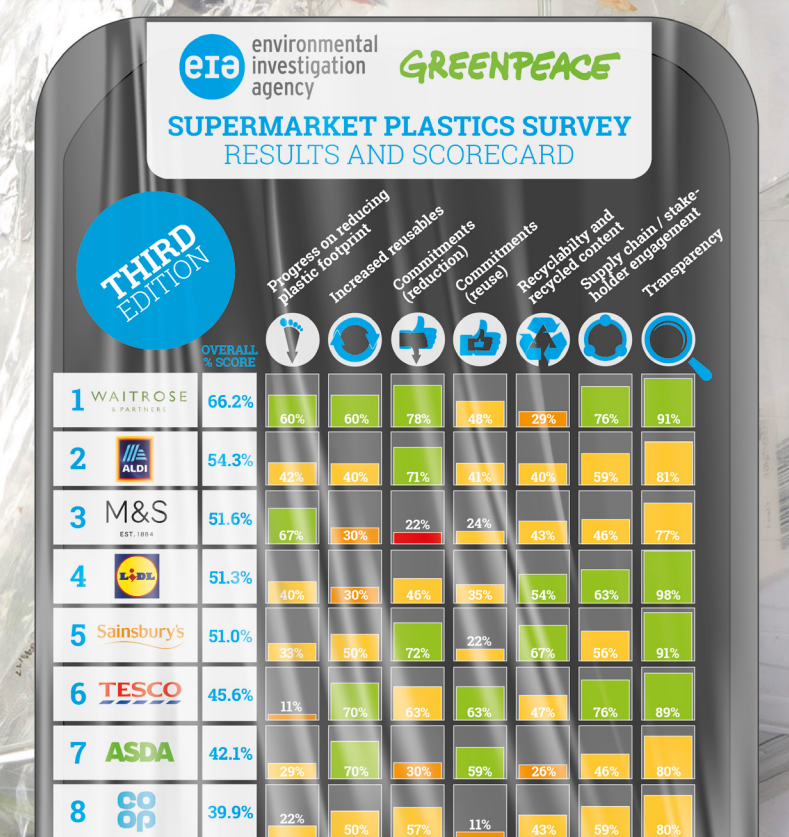
Scorecard from Checking out on Plastics III
Initial Considerations for a Plastics Treaty (2022)
"We have the tools, now let’s build the house."
Soon after the UNEA 5.2 Resolution, EIA provided their initial considerations of key paragraphs in the text of the resolution. EIA's briefing, which can be found in full here, considers two operative paragraphs of the treaty. The report concludes as follows:
"The adoption of UNEA Resolution 5/14 was a historic moment in international environmental policymaking. While the task at hand may seem daunting, a substantial body of work has already been undertaken in preparation for the negotiations, not least the discussions and research delivered by the Ad-hoc Open-Ended Expert Working Group on Marine Litter and Microplastics.
We are not starting from scratch and, in other instruments, have effective models from which to draw inspiration, particularly the Montreal Protocol which is widely considered the most successful MEA (multilateral environmental agreement) in the world."
Additionally, EIA's microsite on the plastics treaty can be found here.
Large Companies - Tesco and Sainsbury’s
Tesco’s Loop Partnership
From September 2021, Tesco has provided customers in ten large Tesco stores in the east of England with a choice to reduce their plastic footprint. Through a partnership with Loop, a global reusable packaging platform, Tesco has offered 88 products in reusable containers on which customers pay a refundable 20p deposit.
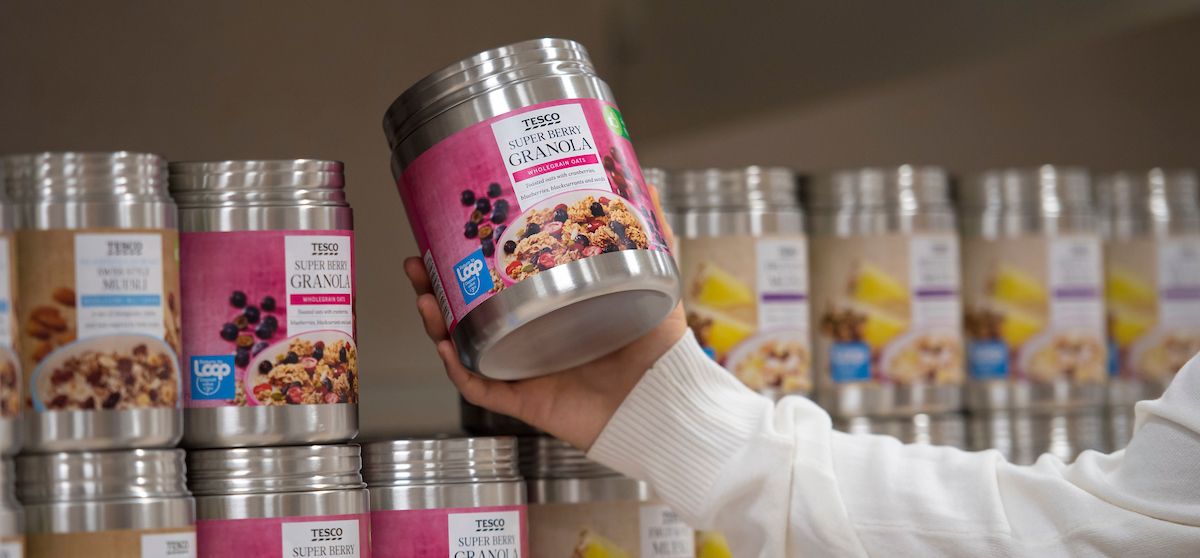
Tesco brand super berry granola in Loop’s reusable product packaging
According to Tesco, the impact of switching just three items to reusable packaging would be huge. “If customers in the 10 stores switched their recyclable tomato ketchup, cola and washing up liquid bottles to the reusable Heinz Tomato Ketchup, Coca-Cola and Ecover alternatives, the packaging would be used and reused more than two and a half million times a year.”
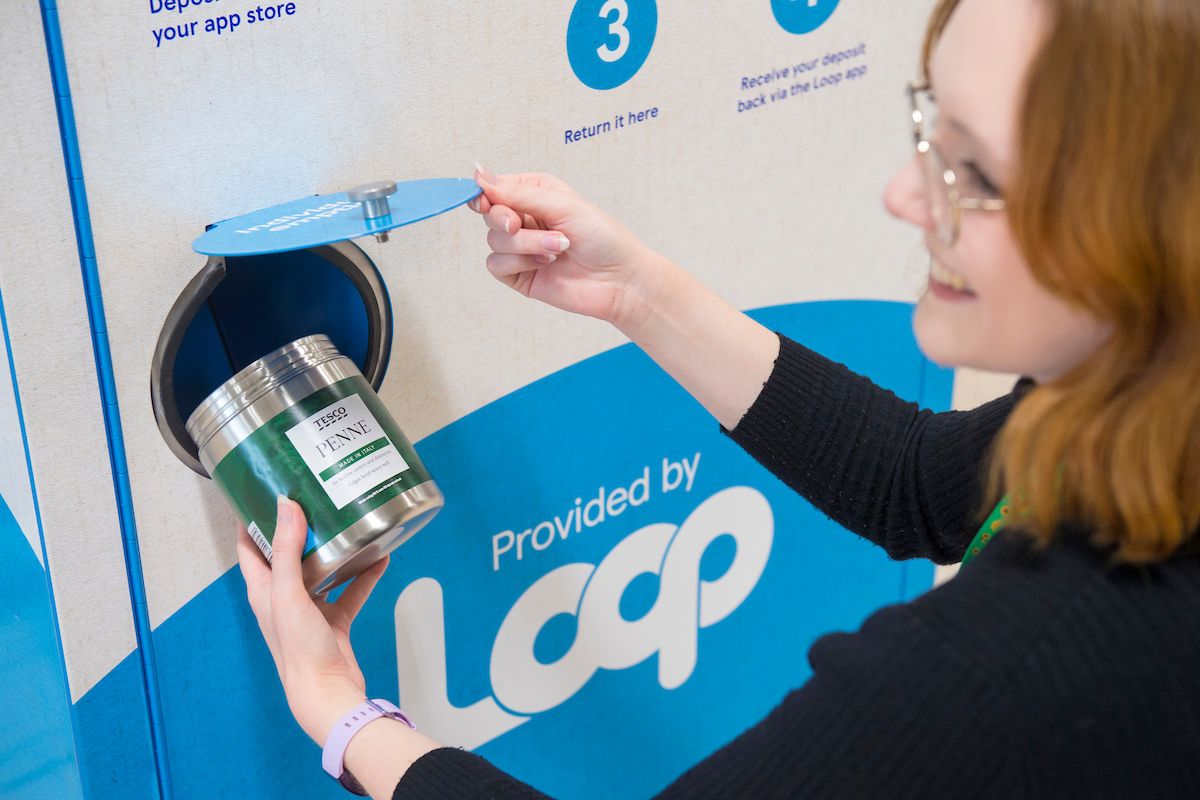
Customer using Loop’s The Returns Point
Tom Szaky, founder and CEO of Loop and TerraCycle, said: "The consumer reaction to Loop in these first Tesco stores will prove pivotal in refining the Loop offering and ultimately we hope to scale reuse across more stores and the number of product lines available. Tesco is the perfect partner to bring Loop to retail in the UK due to its commitment to sustainability, in combating plastics waste and in its operational scale as the UK’s biggest grocery retailer.”
Sainsbury’s
Per the retailer’s resource hub on plastics and Plan for Better Report 2021-2022, Sainsbury’s latest examples of progress on reducing plastic packaging include:
- Removed all plastic packaging from brand lightbulbs and batteries, saving 15 tonnes of plastic per year
- Removed the plastic lids from brand cream pots, saving 106 tonnes of plastic per year
- Removed the plastic film from broccoli, saving 49 tonnes of plastic per year
- Replaced the plastic used in our brand two-litre ice cream tubs, meaning they are now easily recyclable at home, replacing 215 tonnes of hard-to-recycle plastic per year.
Still, Sainsbury’s says it is behind its target trajectory for plastic reduction
Plan for Better Report 2021-2022: “We have seen an absolute reduction in plastic packaging of 2.2 per cent from our 2018 baseline and relative reduction (tonnes per million units sold) of 4.7 per cent from our 2018 baseline. Year-on-year the tonnage has decreased by 626 tonnes to 117,333 tonnes, which puts us behind our target trajectory. We recognise that we have a lot more to do to reduce our plastic packaging tonnage and meet our target to reduce this by 50 per cent by 2025.”
Check in soon for more reports and updates on the UK Plastics Treaty Dialogues, set for Fall 2022.